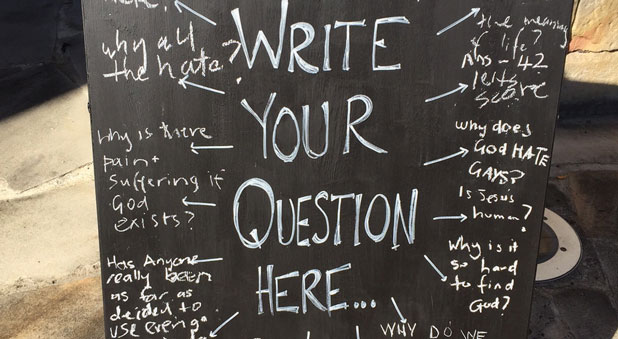Churches often have external signs with messages they want the community to see, but the signs aren’t usually interactive – the church wants to provide some food for thought, and that’s about it.
For the past three years, however, Church by the Bridge in Kirribilli has had a different approach. A chalkboard is placed out the front for a whole month, with an invitation for passers-by to write down questions for God. The most-asked questions form the basis of a sermon series the following month, with all questioners invited to come and hear answers.
“We do get stupid questions like, ‘Why did God create eyebrows?’ and others write rude comments,” says the senior minister of Church by the Bridge, the Rev Paul Dale. “But among the stupid questions and rude comments there are always genuine questions. Another interesting thing is that, because we’re on a main road, people always stop and look at the board and read the questions.”
The local bishop, Chris Edwards, has seen these board-community interactions first hand and has been astounded by its popularity.
“I would imagine people walking by and thinking, ‘I’m not writing on that’,” he says, “and yet I was standing on the other side of the road having a cup of coffee with Paul and he said, ‘Just watch the sign’. In a 20-minute period, six or seven people stopped and wrote a question or made a comment, and four to five times that many stopped to read what was said. And what they write is amazing.”
Mr Dale says why God allows suffering and evil is one of the three most popular queries, and this year “Is God anti-gay?” is also near the top of the list. Yet, he adds, “the most popular question for the past couple of years has been, ‘Why am I so unhappy when I have so much?’
“It’s a deep question. There were also a lot of questions this year on whether you can trust the Bible, and isn’t it just a book? But people are asking more about things to do with the meaning of life, purpose, identity – who am I? And what happens when we die?”
Mr Dale says the chalkboard is a good way for a church in a very visible position, like his, to engage with locals who wouldn’t ordinarily have anything to do with church. But he stresses the importance of it being part of a parish’s wider evangelism strategy rather than just an idea on its own.
“It’s a link in a chain… but it puts God upfront and personal straight away. When people come [to one of the sermons] they are expecting to hear what God has to say.”


























